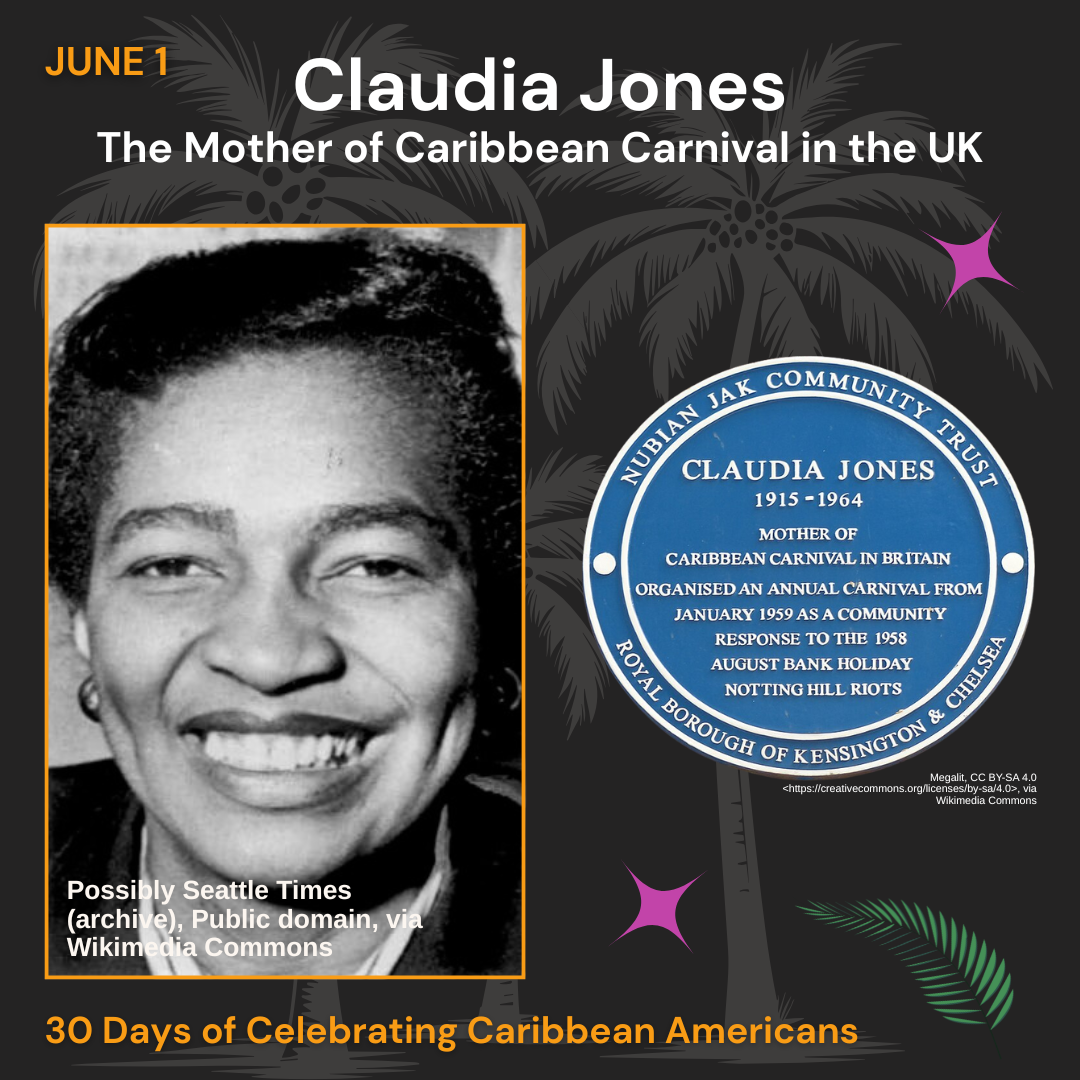Day 1. Claudia Jones The Mother of Caribbean Carnival in the UK.

Today, we celebrate Claudia Jones, a Trinidad-born journalist, activist, and visionary leader whose legacy lives at the heart of cultural resistance and community celebration.
A Story of Resilience and Revolution
Born in Port of Spain, Trinidad in 1915, Claudia Jones moved to Harlem, New York, as a child. She grew up witnessing racial injustice and economic hardship, which fueled her lifelong commitment to activism. Jones became an eloquent journalist and organizer, rising through the ranks of the American Communist Party. She advocated fiercely for Black women’s rights, linking race, gender, and class oppression long before “intersectionality” became a widely known concept.
Facing relentless government persecution during the McCarthy era, Jones was arrested multiple times and eventually deported—not back to Trinidad, but to the United Kingdom in 1955.
Instead of retreating, Claudia planted new seeds of change. In London, she found a Black immigrant community struggling under the weight of racism, police brutality, and poverty. In 1958, following the brutal racist attacks during the Notting Hill race riots, Claudia dreamed up an act of joyful defiance: a Caribbean carnival to bring beauty, pride, and solidarity to her people.
The first indoor Caribbean Carnival, organized by Jones in January 1959, was broadcast by the BBC and brought vibrant music, dance, and food into the public eye. It laid the groundwork for what would become the Notting Hill Carnival, now one of the world’s largest street festivals, attracting millions each year and celebrating Caribbean culture’s resilience and brilliance.
Claudia Jones showed us that culture is not just about art—it’s about survival, dignity, and liberation.
Words to Inspire
“A people’s art is the genesis of their freedom.” — Claudia Jones
“It is only through the creative consciousness and power of the people themselves that we can effect change.” — Claudia Jones
Her words remind us that cultural celebration is itself an act of political power—a way to affirm identity and resist erasure.
Resources to Learn More About Claudia Jones
📖 Biography:
Claudia Jones: Beyond Containment by Carole Boyce Davies. An in-depth look at her life, activism, and intellectual legacy.
🎥 Youtube Clip:
How Claudia Jones fought racism with the Notting Hill Carnival – BBC World Service, Witness History. The story of the first Caribbean Carnival as a response to racism in Notting Hill.
📰 Primary Sources:
A Pride in Being West Indian: Claudia Jones and The West Indian Gazette. A paper exploring the West Indian Gazette. Founded by Jones in 1958, it was Britain’s first major Black newspaper.
Today’s Reflection
Claudia Jones used joy and pride to resist injustice in her community. As you reflect on your own opportunities to resist, we invite you to reflect on the following questions:
💬 How do we use joy, art, and culture as tools for resistance in our own communities?
💬 What can we learn from Claudia Jones about standing strong in the face of exile, rejection, and racism—and building something beautiful in response?
Join us tomorrow as we explore the life and impact of Marcus Garvey and the Black pride movement.
Join us each day this month as we spotlight a different Caribbean American whose legacy calls us to reflect, learn, and celebrate. These stories are about community, culture, and the contributions that come from the rich intersections of heritage and homeland. Our weekly themes will help guide us through different aspects of Caribbean American influence—from activism to art, invention to entrepreneurship—creating a mosaic of identity that is as joyful as it is complex.
For more information and access to other events, sign our Guestbook!
Learn More: Visit the Notting Hill Fair official site for more information about next year’s fair, exhibitors, music, and activities.
Discover more from SepulvedaUU
Subscribe to get the latest posts sent to your email.
